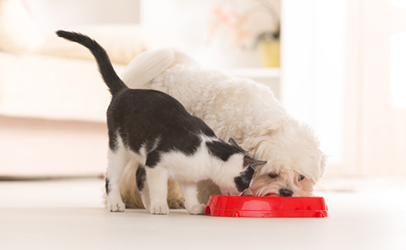
A raw pet food manufactured by Hare Today Gone Tomorrow should be discarded due to potential contamination with Salmonella and Listeria monocytogenes, according to the Food and Drug Administration. People can become infected with the bacteria when they handle the pet food.
Hare Today Gone Tomorrow is a producer of raw food for cats, dogs and ferrets, according to the company’s web site. The company is based in Springboro, PA, and has been operating since 1999. It offers both freeze-dried and raw, frozen and pet foods.
The FDA alert covers four sizes and varieties of a single production lot of the Ground Chicken pet food, all of which bear the processing date of 12.04.2018:
- Ground Chicken/Bones/Organs, 1lb, Fine Ground
- Ground Chicken/Bones/Organs, 2lb, Fine Ground
- Ground Chicken/Bones/Organs, 3lb, Coarse Ground
- Ground Chicken/Bones/Organs, 5lb, Fine Ground
FDA tested the product while following up on a consumer complaint about a kitten that had become infected with Salmonella after eating the raw product. The product tested by FDA was a from a different production batch than the one fed do the kitten, as the original suspect batch was not available for testing.
FDA found both Salmonella and Listeria monocytogenes in the batch produced on Dec. 4, 2018. The strain of Salmonella found in the feces of the sick kitten did not match the strain recovered from the pet food sample. The agency issued the alert in the belief that the product represents a serious threat to human and animal health, as raw pet foods are intended to be served without further cooking.
Salmonella can cause illness and death in both humans and animals. Young children, the elderly and people with weakened immune systems are especially susceptible. People infected with Salmonella are likely to experience diarrhea, abdominal cramps and fever. Infected animals do not always display symptoms, but may exhibit signs of vomiting, diarrhea, fever, loss of appetite, and reduced activity level. Even asymptomatic animals may shed Salmonella in the feces.
Listeria monocytogenes can also infect both humans and animals, although infections in pets are uncommon. Infected pets can spread contamination by shedding the pathogen in their feces.
FDA recommends that people who think their pets have become ill after consuming contaminated pet food should contact their veterinarians.
Veterinarians who wish to have pets tested for Salmonella may do so through the Vet-LIRN Network if the pet is from a household with a person infected with Salmonella. Veterinarians who wish to have pets tested for other pathogens when there is an associated human case may also contact Vet-LIRN.
The FDA encourages consumers to report complaints about this and other pet food products electronically through the Safety Reporting Portal or by calling their state’s FDA Consumer Complaint Coordinators.
(To sign up for a free subscription to Food Safety News, click here.)


